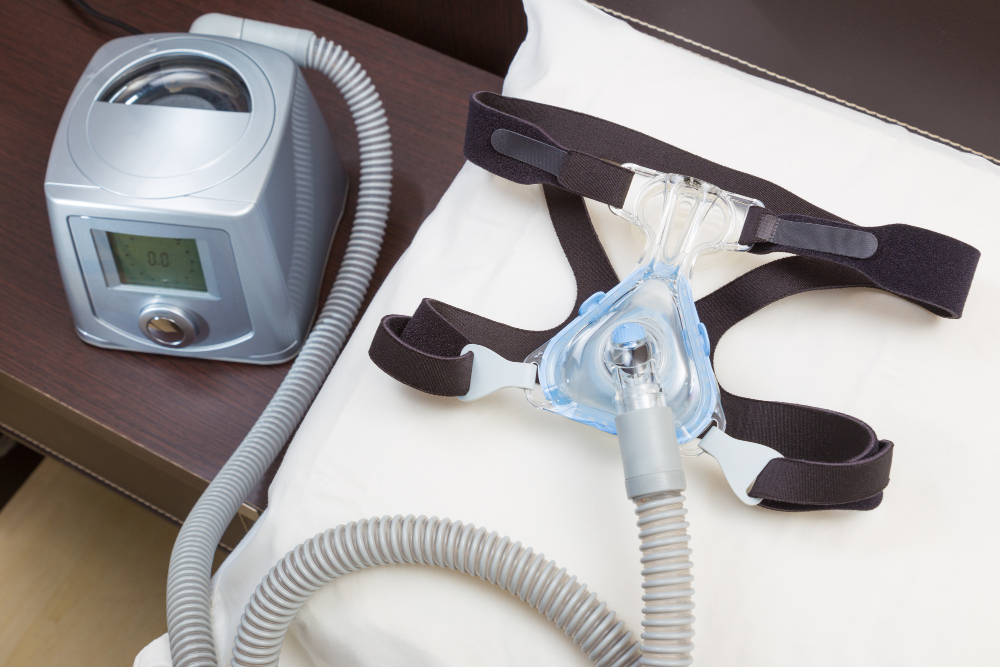Sleep Apnea
Sleep apnea is a serious sleep disorder that affects millions of people worldwide. It occurs when a person’s breathing repeatedly stops and starts during sleep, leading to disrupted sleep cycles and potential health complications. This results in poor-quality sleep, which can lead to daytime fatigue, memory problems, and more severe health issues over time.
There are three main types of apnea:
- Obstructive Apnea (OSA): The most common form, where the muscles at the back of your throat relax excessively, blocking the airway.
- Central Apnea (CSA): This occurs when your brain fails to send the proper signals to the muscles that control breathing.
- Complex Apnea Syndrome: A combination of both obstructive and central this apneas.
Symptoms of Sleep Apnea: How to Recognize?
- Loud Snoring: Loud and frequent snoring caused by blocked airways is a key sign of sleep apnea.
- Gasping for Air During Sleep: People with sleep apnea may suddenly wake up gasping for breath due to airway obstruction.
- Excessive Daytime Sleepiness: Despite a full night's rest, individuals may feel very tired and sleepy during the day.
- Morning Headaches: Oxygen deprivation during sleep can cause headaches in the morning.
- Dry Mouth or Sore Throat: Breathing through the mouth during sleep may cause dry mouth or sore throat.
- Difficulty Concentrating: Poor sleep quality may lead to concentration problems during the day.
If you experience these symptoms, it’s crucial to seek medical attention to determine whether this apnea is the cause.
Sleep Apnea Treatment: How to Manage the Condition
The good news is that this apnea is treatable. Treatment options vary depending on the type and severity of the disorder. Here are some of the most common treatments:
CPAP (Continuous Positive Airway Pressure) Therapy: CPAP is one of the most effective treatments for obstructive sleep apnea. The device uses a mask to deliver a continuous stream of air into the airways, preventing them from collapsing and ensuring proper breathing during sleep.
Lifestyle Changes:
- Weight Loss: Excess weight, especially around the neck area, can contribute to airway obstruction. Losing weight can significantly reduce symptoms.
- Sleep Positioning: Sleeping on your side rather than your back can reduce the likelihood of airway blockage.
- Avoiding Alcohol and Sedatives: These substances relax the muscles in your throat, making it more likely for your airway to collapse.
Oral Appliances: For those with mild to moderate sleep apnea, dental devices that reposition the jaw and tongue may help keep the airway open.
Surgical Options: In severe cases, surgery may be necessary to remove tissue blocking the airway or to reposition the jaw. Surgery is typically a last resort when other treatments have failed.
Medications: Although there are no medications specifically for this apnea, medications may be prescribed to treat related conditions, such as high blood pressure, which can be exacerbated by this apnea.
Sleep Apnea Test: How Is It Diagnosed?
To diagnose apnea, healthcare providers typically recommend a sleep study. This test is conducted to monitor your breathing, heart rate, oxygen levels, and other vital signs during sleep. There are two types of sleep studies:
-
Polysomnography (PSG): This comprehensive test is conducted in a sleep center or hospital, where you’ll be connected to several monitoring devices.
-
Home Test (HSAT): This at-home test is less comprehensive but can be used to diagnose obstructive sleep apnea in people with moderate symptoms.
During a sleep study, the following measurements are typically taken:
- 🧠 Brain activity (EEG)
- 👁️ Eye movement
- 🧁 Oxygen saturation levels
- ❤️ Heart rate and rhythm
- 💨 Breathing patterns
- 💪 Muscle activity
Based on the results of the sleep study, your doctor will determine the severity of your apnea and recommend the appropriate treatment.
Preventing Sleep Apnea: Tips for Better Sleep
While some risk factors for sleep apnea, such as genetics or age, are beyond your control, there are steps you can take to reduce your risk:
- ⚖ Maintain a healthy weight
- 🏃 Exercise regularly
- 🚭 Avoid smoking and excessive alcohol consumption
- 🛌 Practice good sleep hygiene, such as maintaining a regular sleep schedule
Conclusion
Sleep apnea is a potentially serious condition, but with the right treatment and lifestyle changes, it is manageable. If you suspect you have this apnea, seek a professional diagnosis to ensure that you receive appropriate care. Whether through CPAP therapy, lifestyle changes, or surgery, managing this apnea can lead to better sleep and improved quality of life. Stay informed, monitor your symptoms, and consult a healthcare provider to take control of your sleep health.
Frequently Asked Questions
1. What is Sleep Apnea?
Serious sleep disorder where breathing repeatedly stops and starts during sleep. This condition can lead to fragmented sleep and a drop in oxygen levels, affecting overall health.
2. What Are the Symptoms of Sleep Apnea?
Common symptoms include loud snoring, choking or gasping for air during sleep, excessive daytime sleepiness, difficulty concentrating, and irritability.
3. How Is Sleep Apnea Diagnosed?
Typically diagnosed through a sleep study or polysomnography. This test monitors your sleep patterns, heart rate, oxygen levels, and other bodily functions during sleep.
4. What Are the Treatment Options for Sleep Apnea?
Treatment options for sleep apnea may include CPAP therapy, oral appliances, lifestyle changes (such as weight loss and sleep position adjustments), and, in some cases, surgery.
5. Can Sleep Apnea Kill You?
Yes, untreated this apnea can lead to serious health complications like heart disease, stroke, high blood pressure, and diabetes. Over time, these conditions can increase the risk of premature death. Early treatment is crucial to managing the risks associated with this apnea.
6. How Does Sleep Apnea Affect Your Health?
Can lead to multiple health issues, including increased risk for cardiovascular problems, stroke, and diabetes. The lack of oxygen during sleep puts strain on your heart, increasing the likelihood of heart attacks and arrhythmias.
7. What Are the Causes of Sleep Apnea?
Common causes of this apnea include obesity, nasal congestion, age, family history, and certain lifestyle factors like smoking and alcohol consumption.
8. How Can I Prevent Sleep Apnea?
While not all cases can be prevented, maintaining a healthy weight, avoiding alcohol and sedatives before bed, sleeping on your side, and treating underlying health conditions can help reduce the risk of developing this apnea.





